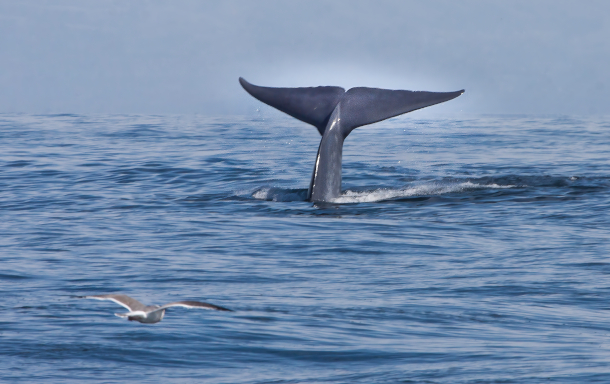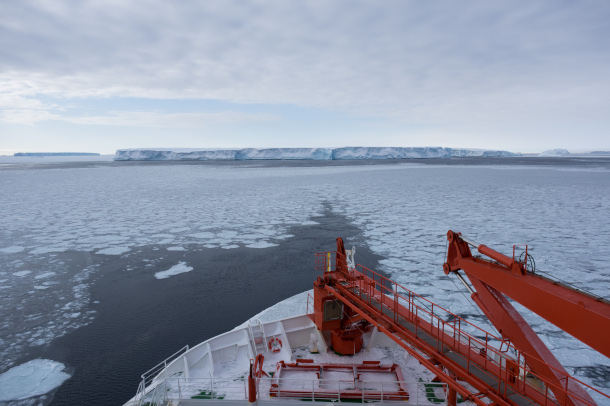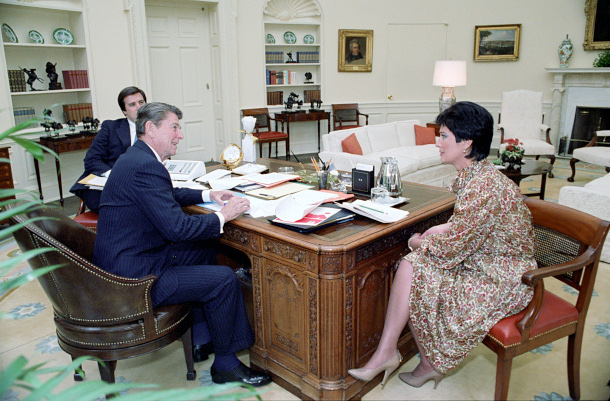Beyond the Headlines
Air Date: Week of March 10, 2023

The United Nations has approved a treaty to protect ocean biodiversity on the high seas. (Photo: Gregory “Slobirdr” Smith, Flickr, CC BY-SA 2.0)
Host Steve Curwood and Living on Earth contributor Peter Dykstra look beyond the headlines to a United Nations ocean biodiversity protection treaty, along with the newly designated Chilean Tictoc marine park for whales. Then, the pair discuss Antarctica's diminishing sea ice, before looking back to the historic resignation of EPA Administrator Anne Gorsuch-Burford.
Transcript
CURWOOD: On the line now with me from Atlanta, Georgia is Peter Dykstra. Peter's a contributor to Living on Earth who's always looking beyond the headlines for us. What do you see today, Peter?
DYKSTRA: Hi, Steve, we'll start with a little good news, because we always want to tell folks about the good news. After years of going back and forth, members of the United Nations have agreed on a treaty to protect biodiversity on the high seas. It's something that's been tossed around forever. The Law of the Sea Treaty has been out there forever. It was ratified in 1994, but never ratified by the United States of America. Marine biodiversity wasn't something that was even considered back then. But look at all the species that migrate in the ocean, that cross national borders and spend a lot of time on the high seas, where there traditionally has been no effective protection. But marine biodiversity is at the heart of this agreement. This is the first step in putting some major regulation and restriction on what can be done about protecting the oceans.
CURWOOD: That's right, I think the majority of the surface of the ocean is not inside some nation's economic zone or something. The so-called high seas where, for very, very long, there's kind of an 'anything goes' attitude.
DYKSTRA: Right, and there are a lot of things like the improved satellite monitoring of the high seas, where there are areas when you cannot, in any practical way, police the oceans from the oceans. But from a satellite, you can find factory fleets operating illegally to overfish. You could find pirate fishing boats, as they're called, out there to take species and completely ignore their endangered or threatened status. So we're beginning to close these loopholes. There's still a long way to go. But in terms of ocean biodiversity, here's a step forward.
CURWOOD: Yeah, I mean, hopefully the United States will ratify this agreement, because people are more and more aware of how important these protections are. In fact, there's a recent one that, where is it in South America, that's just been declared, Peter.
DYKSTRA: An area called Corcovado Gulf, nearly pristine. Chile has set up something called - and I'm not making this up, this is the name - the Tictoc marine park. It has no relation to children's games or sound effects, or large controversial social media sites. But that's what it's called, the Tictoc marine park. And the thing that's a really big deal is the biggest animal in the world. As much as 10% of the world's blue whale population spends time in Corcovado Gulf. The blue whale is seriously endangered, and 10% of their population is going to get a little bit more protection.
CURWOOD: Well, that is really good news as well. Hey, what else do you have for us today, Peter?

Sea ice levels in Antarctica reached a historic low this year. (Photo: Povl Abrahamsen, Flickr, CC BY-NC 2.0)
DYKSTRA: Something from the southern oceans. That is new news. We thought this was the case, now there's confirmation from satellite records and other monitoring that the Antarctic sea ice, not the glaciers on the land base of Antarctica, but the sea ice surrounding the continent reached its lowest levels ever. As much as 90% of the sea ice that used to be there was gone this year. It's a huge shift. And it could have huge impact on the continent itself, as well as access to the fish species, largely unexploited, that are known to exist around Antarctica.
CURWOOD: Yeah, and as I understand it, the Antarctic sea ice helps hold the glaciers that are onshore that are on the land there. Kind of blocks it, keeps it from sliding into the water. But now it's the smallest level ever. I mean, losing this fringe of sea ice might speed up perhaps a rise in world sea levels.
DYKSTRA: That's right, as land-based ice from glaciers and ice shelves continues to melt. That's what threatens places from Miami and lower Manhattan to coastlines around the world. And that sea level rise from land-based ice does have sort of a two step connection to what's going on with sea ice around the Antarctic continent.
CURWOOD: Of course, we're now nearing the end of the summer in the southern hemisphere. In the northern hemisphere where we are, Peter, the ice is lowest in September. So hey, what do you have for us from the annals of history today?

EPA Administrator Anne Gorsuch Burford (right) meets with President Ronald Reagan (left) and White House Cabinet Secretary Craig L. Fuller (back). (Photo: White House Photograph Collection, Wikimedia Commons, Public Domain)
DYKSTRA: A 40th anniversary of a momentous thing in the history of the US EPA, because on March 9, 1983, Anne Gorsuch Burford, who was President Reagan's EPA Administrator, resigned under fire. She had a very controversial, stormy time at EPA, marked particularly by a scandal over handling money in the Superfund toxic waste program. Gorsuch Burford's number one assistant went to prison for it. Anne Gorsuch Burford avoided prison time, but left under, no pun intended, kind of a toxic cloud.
CURWOOD: Peter Dykstra is a contributor to Living on Earth. Thanks so much, Peter, we'll talk to you again real soon.
DYKSTRA: Okay, Steve, thanks a lot and we'll talk to you soon.
CURWOOD: And there's more on these stories on the Living on Earth webpage. That's LOE.org.
Links
AP News | “Nations Reach Accord to Protect Marine Life on High Seas”
Cetacean Specialist Group | “Blue Whales Protected in the Largest Marine Park in Continental Chile”
Living on Earth wants to hear from you!
Living on Earth
62 Calef Highway, Suite 212
Lee, NH 03861
Telephone: 617-287-4121
E-mail: comments@loe.org
Newsletter [Click here]
Donate to Living on Earth!
Living on Earth is an independent media program and relies entirely on contributions from listeners and institutions supporting public service. Please donate now to preserve an independent environmental voice.
NewsletterLiving on Earth offers a weekly delivery of the show's rundown to your mailbox. Sign up for our newsletter today!
 Sailors For The Sea: Be the change you want to sea.
Sailors For The Sea: Be the change you want to sea.
 The Grantham Foundation for the Protection of the Environment: Committed to protecting and improving the health of the global environment.
The Grantham Foundation for the Protection of the Environment: Committed to protecting and improving the health of the global environment.
 Contribute to Living on Earth and receive, as our gift to you, an archival print of one of Mark Seth Lender's extraordinary wildlife photographs. Follow the link to see Mark's current collection of photographs.
Contribute to Living on Earth and receive, as our gift to you, an archival print of one of Mark Seth Lender's extraordinary wildlife photographs. Follow the link to see Mark's current collection of photographs.
 Buy a signed copy of Mark Seth Lender's book Smeagull the Seagull & support Living on Earth
Buy a signed copy of Mark Seth Lender's book Smeagull the Seagull & support Living on Earth

